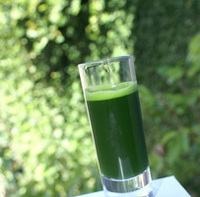Proponents of extreme detoxes say modern life saps our energy and makes us prone to illness. Opponents argue we are naturally equipped to detox, with our vital organs acting as garbage trucks for our bodies – routinely collecting and dumping our toxins.
So who is right? I’m the editor of a weight-loss and health magazine and I’ve just about seen it all – anecdotally and scientifically – when it comes to detoxing. The anti-detoxers have this right: our major organs (particularly the liver but also the kidneys, skin and lungs) are a nature-built detoxification system. But the detox cheerleaders understand the lifestyles most of us lead (ahem, too much alcohol, processed food and stress), mean for our bodies it’s a bit like driving with the handbrake on most of the time.
Is an extreme detox really necessary?
So how do we get the handbrake off and pump our tanks full of premium? Well, stop thinking of detoxing as a healthy-living bender. I’ve tried a detox or two, plus I’ve assigned unsuspecting journos to do the same thing and the common themes are these: headaches, irritability, anti-social behaviour, resentment and falling off the wagon – usually around day three. Admittedly, detoxers usually have clearer skin and eyes and more energy. But then it’s not surprising when you’re eating a diet that’d make Bugs Bunny jealous and you’ve been home on the couch four nights running.
When embarking on a detox program ask yourself ‘What aspects of this am I prepared to still be doing three weeks from now?’ Chances are, forking out for expensive supplements, forgoing coffee and being vegetarian aren’t among your answers. And herein lies the problem with most detoxes: effectively they are just fad diets (a la cabbage soup, food combining, grapefruit, blood type, et al) but with a snazzier, legitimate-sounding name. “Your health is a long-term investment, not a series of short-term deposits,” says accredited practising dietitian Lisa Renn from the Dietitians Association of Australia. “Detoxes enforce a fad-like mentality and encourage the elimination of food groups – which is potentially dangerous.”
Try to anti-tox instead
Even if an all-or-nothing approach isn’t a good idea, what can we take from detox principles to feel fabulous all the time? Detoxing tends to be the domain of naturopaths (think the ‘cut out dairy and wheat’ types) but does have some fans among the medical community. Consequently foods considered ‘toxic’ range from the obvious – red meat, sugar and alcohol – to the more obscure, like mushrooms, vinegar and nuts, in the case of celebrity detox guru Dr Joshi.
Confused? So am I. And I’ve been writing nutrition stories for years. The answer is to take a great big dose of common sense. So here is my common sense guide to living an anti-tox life (subtitled: I’ve read a lot of stuff on health and nutrition and this makes the most sense).
You can drink alcohol. Just don’t binge
Don’t be fooled by the ‘alcohol has antioxidants’ message. It turns our liver (which happens to be the body’s main detoxification organ) from Ferrari to Fiat. “Alcohol in moderation is ok, it’s binge drinking that’s unhealthy,” says Renn. The government guidelines for women are two standard drinks a day on average, no more than four drinks in any one day, and two alcohol-free days a week. If you do like to quaff, choose red wine, especially tannic varieties, as these contain the most protective antioxidants.
Sugar is sour for your diet
Definitely not as sweet as it sounds, sugar has few redeeming qualities. Skin expert Dr Perricone says it “results in stiff, inflexible, sagging skin”. Not pretty. While Oprah’s health guru Dr Oz says sugar causes “an insulin surge that means two hours after consuming it, you feel famished and tired”. And according to David Gillespie, author of Sweet Poison: Why sugar makes us fat, it’s the number one reason we’re facing a global obesity epidemic.
Limiting the sugar in our diet will make us slimmer, happier and more glowing. Easy right? Not really – just like illicit drugs, the more sugar we have the more we want in order to combat the blood-sugar swings. Scary huh? Eliminate the sugar in your diet (by the way, that includes fruit juices, artificial sweeteners and hidden sources in processed foods and cereals) by slowly weening yourself off it and switching to low-GI carbohydrates.
Daily coffee is actually ok
Often the first thing to be sacrificed to the Monday morning detox gods, coffee isn’t the bad-health culprit we make it out to be. “Three to four cups a day of coffee is not a problem,” says Renn. And that makes us say halleluiah! International research has found caffeine can even have beneficial effects for diabetes, asthma and liver disease. Renn believes coffee consumption is only problematic when it displaces a healthy diet or causes sleep disturbances.
Vegetables are nature’s anti-agers
We happily pay hundreds of dollars for creams that deliver antioxidants topically to the skin. Meanwhile a carrot contains vitamins A, B and C and costs about 80 cents. Don’t forget to nourish your skin from the inside as well.
– Kate Fitzpatrick



